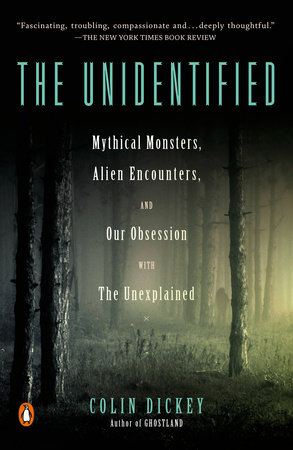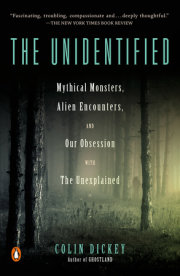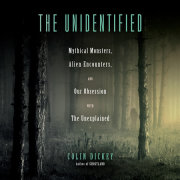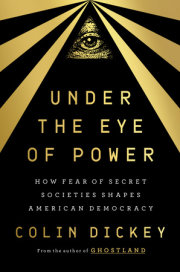[ 1 ] The Man Who Could Not Be TurnedLater, Ignatius Donnelly would recall those heady days of 1856. Standing on the broad porch of his new mansion that overlooked the Mississippi River, he wondered to himself, "Here I am, but twenty-six years old, and I have already acquired a large fortune. What shall I do to occupy myself the rest of my life?"
He didn't have to worry; within a year everything would have changed, and the path of his life would take him through some of the most bizarre twists possible. Born in Philadelphia to two successful Irish immigrant parents, Donnelly had established himself as a lawyer in Philadelphia. But after his marriage in 1856, he'd decided the world held bigger things for him, so he'd come to Minnesota. He was part of a generation of young men who saw the West as the promised land, a place of wild speculation, where their fortunes would be made and their characters forged. The spirit of the age was embodied in a quote often attributed to Horace Greeley (though he likely popularized it rather than coined it): "Go West, young man, go West and grow up with the country." Donnelly took this to heart.
Donnelly, in concert with a few other investors, developed a bold plan to acquire a large parcel of undeveloped land just down the Mississippi River from Hastings, Minnesota. While Hastings was a thriving town, Donnelly was sure the site he'd chosen was better-a better steamship landing and a more entrancing view of the river-imagining it a future hub for the northern Mississippi. They'd bought the land for roughly six dollars a parcel, but were planning on selling those same parcels at one hundred to five hundred dollars each. The town was named for Donnelly's business partner, John Nininger, but it would be Donnelly who'd be the voice and the face of the project, and Donnelly who would in time earn the nickname the Sage of Nininger. He portrayed the West as a land of wealth and wonder, a place that "will yet play an important part in the great drama of human advancement." The West, he prophesized, would be the new Eden.
Such boosterism depended on the lie that the land was itself uninhabited, when in reality, of course, the indigenous peoples of North America were being pushed steadily westward. Manifest Destiny, as the policy came to be known, offered a mythological and seemingly predestined underpinning to a process of violent expropriation. Donnelly, like many, saw-and embraced-this, telling potential investors that the "embers of the Indian's fire will scarcely have disappeared from the heath where his wigwam stood, before the halls and palaces of the most elaborate social life will rise upon their site."
Initially things went well for Donnelly; plots sold, the money rolled in, and he put a down payment on a massive ferry that would serve Nininger and bring commerce to the town. But the tide quickly turned, and instead of a boomtown, Donnelly found ruin. In 1857 a panic swept the country's economy, constricting credit and drying up speculation. Nininger was just one of many casualties. He went bankrupt before the ferry could be delivered and defaulted on the balance.
Donnelly's dream of a utopia in the West had met with the harsh reality of capitalism. He entered politics, going on to serve as the lieutenant governor of Minnesota and later in the US House of Representatives, before getting pushed out of politics in the 1870s, leaving him to pursue another career. Ignatius Donnelly had been to the ends of the Earth, at least figuratively, and had met only financial ruin. Now he would re-create the history of a place that would never be touched by money, politics, or the imperfect hands of modern man: in 1882 he turned to publishing, producing an unexpected bestseller, Atlantis: The Antediluvian World.
*
When Max Weber argued that the modern world was becoming "disenchanted," he didn't just mean that it had lost religion. The physical world itself seemed to have lost its luster, its mystery and magic. As modernity, with its emphasis on transactions, calculations, rationality, and commerce, spread throughout the world, those places that had long been seen as "exotic" became ordinary.
In the United States, Weber's ideas took on a topographical dimension: the enchanted world was a place, a frontier, and that place was disappearing. In 1910, the historian Frederick Jackson Turner described how the American frontier was nothing less than a mythical place where the individual discovered and forged himself: "The first ideal of the pioneer," he wrote, "was that of conquest. It was his task to fight with nature for the chance to exist. Not as in older countries did this contest take place in a mythical past, told in folk lore and epic. It has been continuous to our own day. Facing each generation of colonists was the unmastered continent." Turner's was perhaps the most eloquent and influential voice of the self-serving story of Manifest Destiny. The frontier-wild and dangerous, composed of "vast forests," "barren oceans of rolling plains," and (significantly) "a fierce race of savages"-was where the American man became a man: where he faced danger, surmounted it, and established his civilizing dominion over the wilds. (In frontier romanticism, indigenous populations either exist as dangerous threats or they don't exist at all, as when destiny manifesters claim the wilderness is "empty.")
But this frontier, Turner lamented, was disappearing, this myth a victim of its own success. Rail lines had bound more and more of the earth into a tighter and tighter web, standardizing time zones and organizing the whole world into one interconnected network. Territories became states, and the continent's indigenous populations were forced into smaller and smaller reservations, leaving the rest for agriculture and mining pursuits. The enchanted frontier, with its danger and "primitive savages," was gone.
Donnelly is perhaps the best example of someone who resisted this disenchantment of the world by imagining a world beyond the reach of capitalism or the railroads, a place locked in a premodern time, a place of perpetual enchantment.
Atlantis was first mentioned in two dialogues of Plato, Timaeus and the unfinished Critias: as with his Republic, Plato uses the story of Atlantis to test out his theories about what does or doesn't make for a successful political framework. Socrates asks his interlocutors how an ideal state should operate, imagining a hypothetical situation, but Critias instead gives him a supposedly factual one: a "strange but true" story that he heard from his grandfather, who in turn heard it from a traveler named Solon, who in turn heard it from some Egyptians while he was traveling through the Nile Delta region. Atlantis would appear again as an allegory for an ideal place, akin to Thomas More's Utopia, as it did in Francis Bacon's unfinished 1627 novel, The New Atlantis; and as a fantastical civilization, appearing in Jules Verne's 1870 novel Twenty Thousand Leagues Under the Sea.
Donnelly was also likely inspired by Heinrich Schliemann, a German businessman with no formal training in archaeology, who'd used clues from Homer's Iliad to discover the ruins of the lost city of Troy. But Donnelly wasn't about to dive underwater in search of Atlantis; he wasn't leaving his library. Donnelly's book of armchair geology and anthropology argued it was a physical place, one irrevocably sunk under the ocean, taking Plato's Critias at an entirely new level of credulity. His book borrows freely from geology, climatology, anthropology, and literature (among other disciplines) in order to make a dramatic revision of the history of the ancient world.
Donnelly was well read, though he was not a trained scientist, historian, or anthropologist. But he was able to use familiar, if little understood, scientific principles to bolster his claims-that the Gulf Stream's circular motion, for example, could be accounted for by the lost continent. "When the barriers of Atlantis sunk sufficiently to permit the natural expansion of the heated water of the tropics to the north, the ice and snow which covered Europe gradually disappeared; the Gulf Stream flowed around Atlantis, and it still retains the circular motion first imparted to it by the presence of that island."
For Donnelly, Atlantis was an easy answer to a prevailing series of questions regarding geology, wind dynamics, and ocean currents, not to mention comparative mythology, archaeology, and evolution. Vague and all-purpose, it became a grand unifying theory bringing together all these strains of unknowns, a single geographic location marrying all the natural sciences, as well as the humanities. What's more, it offered new directions for all of these pursuits: "We are but beginning to understand the past," Donnelly explains, casting the potential discovery of Atlantis as of a piece with Pompeii, Herculaneum, pre-Columbian cultures, and hieroglyphics. "We are on the threshold. Scientific investigation is advancing with giant strides. Who shall say that one hundred years from now the great museums of the world may not be adorned with gems, statues, arms, and implements from Atlantis, while the libraries of the world shall contain translations of its inscriptions, throwing new light upon all the past history of the human race, and all the great problems which now perplex the thinkers of our day?"
What Donnelly offered was a style that appeared scientific while creating new frontiers, new borderlands, and liminal spaces, places not yet colonized-and in some fundamental sense, unable to be colonized. At a time when Western culture saw its borders filling in, Donnelly magicked up a mythical continent that could never be reached-and the public ate it up.
Atlantis: The Antediluvian World went through more than twenty editions in the United States and in Great Britain within the first decade of its publication. The prime minister of England, William E. Gladstone, wrote to Donnelly to say that "I may not be able to accept all your propositions, but I am much disposed to believe in an Atlantis." Charles Darwin wrote to Donnelly to report that he had read it with interest, though he remained skeptical. Even those unconvinced by his argument were appreciative of the sheer volume of scientific evidence Donnelly put forward. The mayor of Chicago told him he was "crazy as a loon," but he meant it as a compliment.
History has been harsher to Donnelly. A major problem with Atlantis is what anthropologists and archaeologists refer to as "diffusionism," and what archaeologist Kenneth Feder describes as the idea that "cultures are basically uninventive and that new ideas are developed in very few or single places. They then move out or 'diffuse' from their source areas." Rather than recognizing that the ancient civilizations like the Mayans and the Egyptians were fully capable (like the Greeks and Romans) of developing sophisticated literature, art, and architecture, diffusionists assume that they must have all gotten this from somewhere, a none-too-subtle racism that denies any non-European people their own culture. (This is almost a complete 180-degree revolution from frontier racism: these cultures aren't dangerous, and they aren't erased, but their cultural achievements are entirely subordinated to the diffusionist story.) Donnelly, never one to half-ass anything, took this so far that Atlantis is regularly accused of "hyperdiffusionism," so egregious was his error.
Like a conspiracy theorist, Donnelly's scholarship is a form of apophenia (the tendency to see patterns and connections where none exist), applied on a cultural level. Diffusionism looks for coincidences, similarities, and accidents that bear a superficial resemblance, and then constructs theories based on those false pattern recognitions. It is to take the messy soup of human history, its supreme varieties and differences, and find in them enough random correspondences that you can distill everything down to a simplistic creation myth.
Donnelly, meanwhile, went on to a series of increasingly more convoluted conspiracies and wild theories. He followed Atlantis with Ragnarok: The Age of Fire and Gravel, predicting the imminent end of the world; and then with his magnum opus, a thousand-page book entitled The Great Cryptogram, which argued, as some had done before him, that Shakespeare was not the author of the plays attributed to him; and finally a series of novels in the 1890s.
But it was Donnelly's Atlantis that remains his legacy. In the years since its first publication, it has spawned dozens of imitators, including books by the founder of anthroposophy, Rudolf Steiner, and Lewis Spence, who published a flurry of books on Atlantis in the opening decades of the twentieth century. His 1924 The History of Atlantis (his third of five books on the continent) opens with a basic fact: "A history of Atlantis must differ from all other histories, for the fundamental reason that it seeks to record the chronicles of a country the soil of which is no longer available for examination to the archaeologist." Atlantis existed between these two poles: it was both the future of science and outside of its reach.
Donnelly's impact was not just in cementing a vision of a lost continent in the public; he also demonstrated firsthand a path toward minor success through a splendid amateurism, one that eschewed traditional academic research in favor of armchair theorizing-a theorizing that played to a deep-seated wish fulfillment on the part of his audience. What Donnelly demonstrated above all is that you don't have to take on the scientific establishment directly if you can convince the public instead.
There was a name for people like Donnelly. They were called cranks.
The term "crank" had been popularized by Oliver Wendell Holmes, who'd made a name for himself as the author of a series of pithy sketches originally published in The Atlantic, eventually gathered in a book called The Autocrat of the Breakfast-Table, a series of humorous tales of various occupants of a New England boardinghouse successful enough to span a number of sequels, including 1891's Over the Teacups. This last includes Holmes's narrator dismissing a "class of persons whom we call 'cranks,' in our familiar language," before he's interrupted by boarder "Number Seven" (everyone is identified solely by numbers), who rises to their defense: "A crank is a man who does his own thinking. . . . There never was a religion founded but its Messiah was called a crank. There never was an idea started that woke up men out of their stupid indifference but its originator was spoken of as a crank. Do you want to know why that name is given to the men who do most for the world's progress? I will tell you. It is because cranks make all the wheels in all the machinery of the world go round."
Unlike a snake oil salesman, a con artist, or a grifter, the crank is a true believer, convinced that they alone have seen through the myopia afflicting common society. The crank is always offering a version of the Perpetual Motion Engine: something that seems tantalizingly plausible, and utopian in its ramifications, but undercut by the stubborn reality of the laws of physics. To be a crank is to offer a Grand Unified Theory that explains everything, that reinvents the wheel or rediscovers fire. Holmes's Number Seven is not wrong that all messiahs are called cranks, because many cranks offer themselves up as messiahs.
Copyright © 2020 by Colin Dickey. All rights reserved. No part of this excerpt may be reproduced or reprinted without permission in writing from the publisher.








